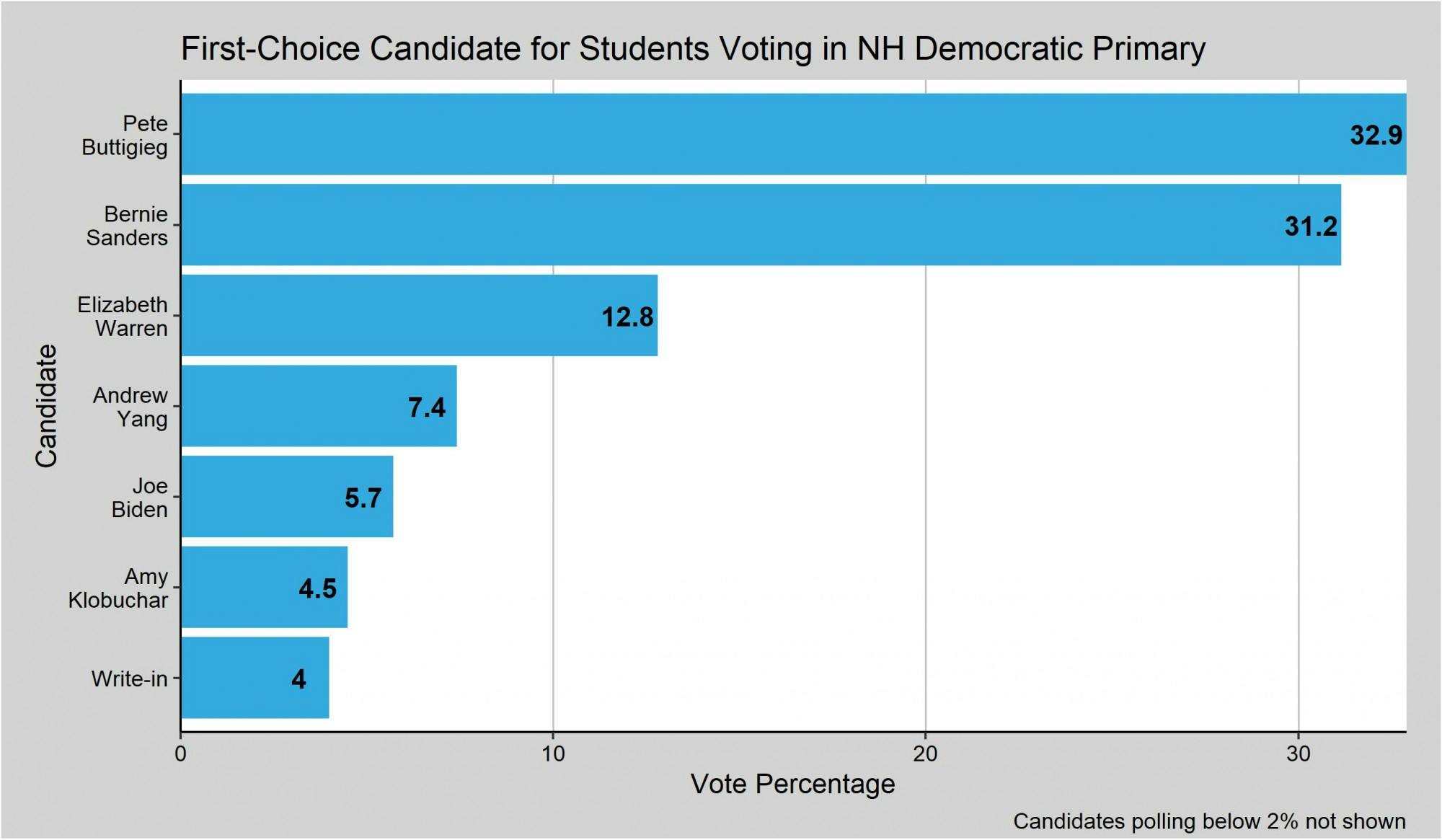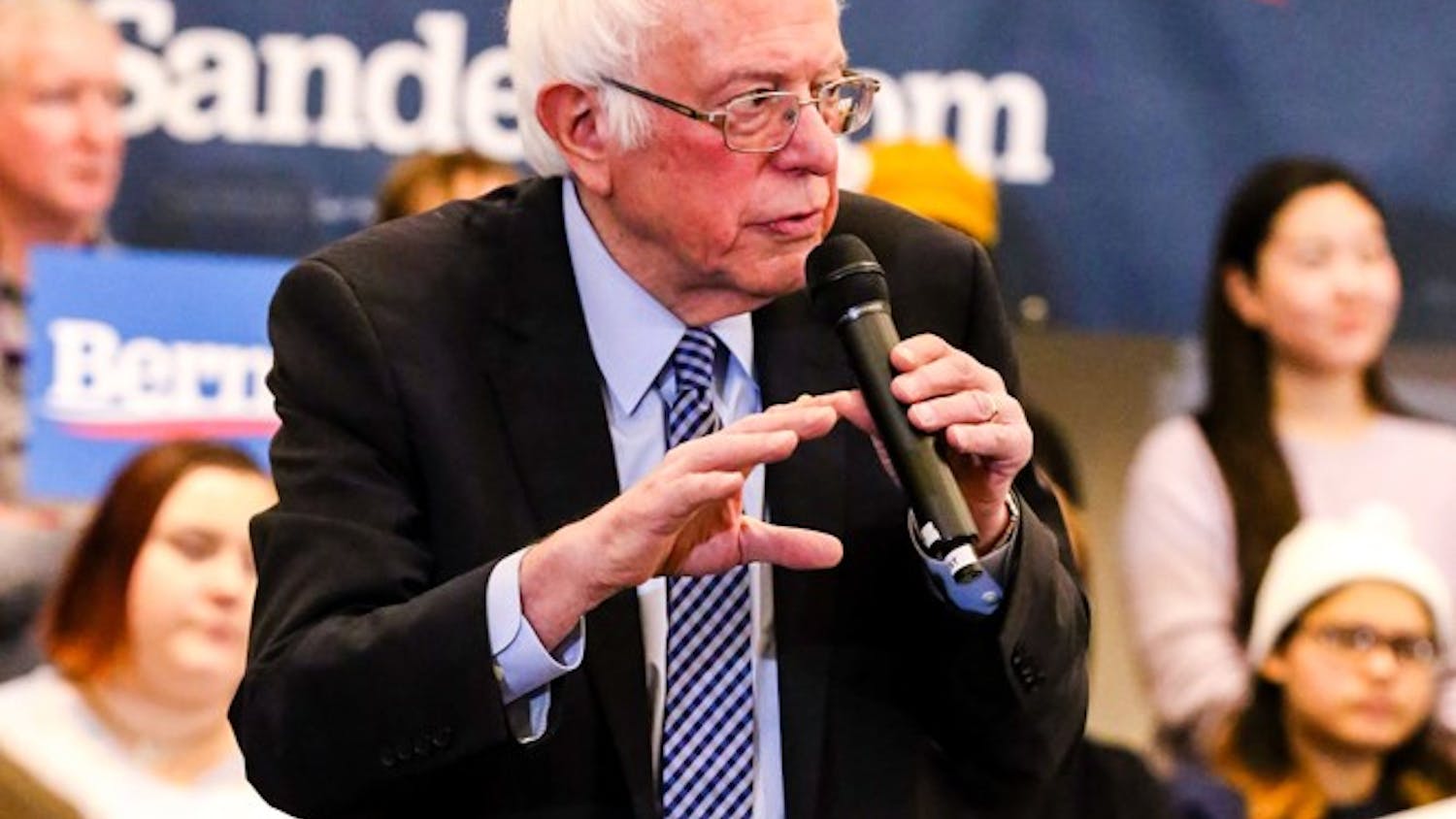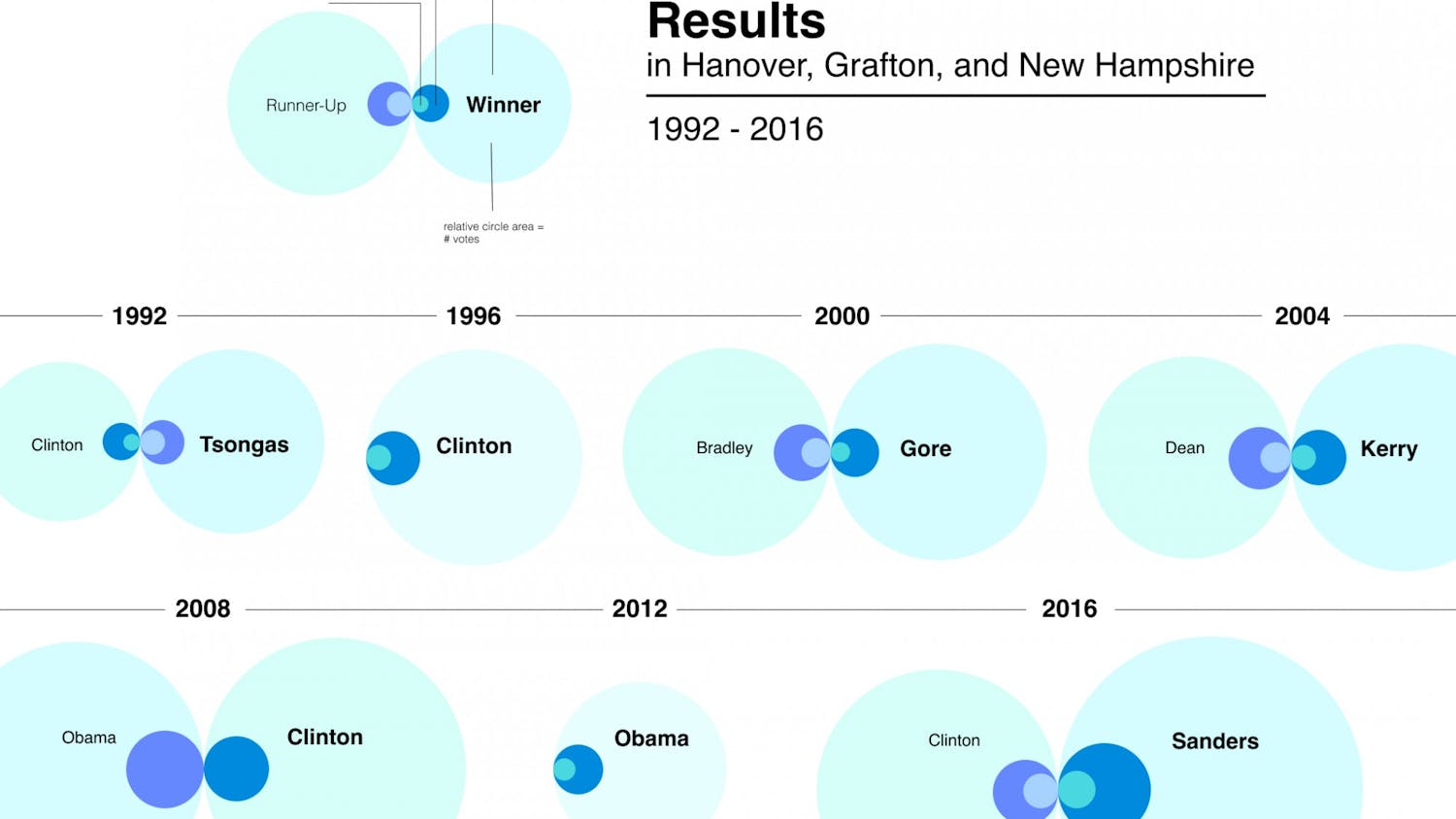With voters in New Hampshire heading to the polls today for the first-in-the-nation presidential primary, Dartmouth students are closely divided in their preferred candidates, according to a poll conducted by The Dartmouth this past weekend.
In the poll, students were asked about the presidential primary, engaging in the upcoming election and the impeachment proceedings against President Donald Trump. The key results are presented below.
Buttigieg and Sanders neck-and-neck in New Hampshire
Former South Bend, IN mayor Pete Buttigieg leads in support among Dartmouth students who indicated they plan to vote in today’s Democratic primary, with 33 percent choosing him as their first-choice candidate. Sen. Bernie Sanders (I-VT) is close behind, with 31 percent of students indicating he is their first choice. Other candidates who are also receiving some level of support include Sen. Elizabeth Warren (D-MA) with 13 percent, Andrew Yang with 7 percent, former vice president Joe Biden with 6 percent, Sen. Amy Klobuchar (D-MN) with four percent and Rep. Tulsi Gabbard (D-HI) with two percent. Sen. Michael Bennet (D-CO), former Massachusetts governor Deval Patrick and Tom Steyer received no measurable support.
Among students planning to vote for Sanders in the New Hampshire primary, 73 percent describe themselves as “very liberal,” while 80 percent of Buttigieg voters identify as “centrist” or “left-leaning.”
Fifty-eight percent of students plan to vote in today’s Democratic primary, while another 2 percent plan to vote in the Republican primary. Twenty percent of students indicated that they plan to vote in another Democratic caucus/primary, 3 percent indicated they plan to vote in another Republican caucus/primary and 17 percent indicated that they do not plan to vote in a caucus/primary.
Among Democratic voters’ second-choice candidates, Warren was the most popular, with over 22 percent indicating that she would be their second-choice candidate. Warren is followed by Biden with 17 percent, Klobuchar with 15 percent, Sanders with 14 percent and Yang with 12 percent.
The most common second-choice candidates for students who selected Buttigieg as their first choice were Biden with 37 percent and Klobuchar with 20 percent. On the other hand, the most common second-choice candidate for students indicating Sanders as their first choice was Warren with 58 percent.
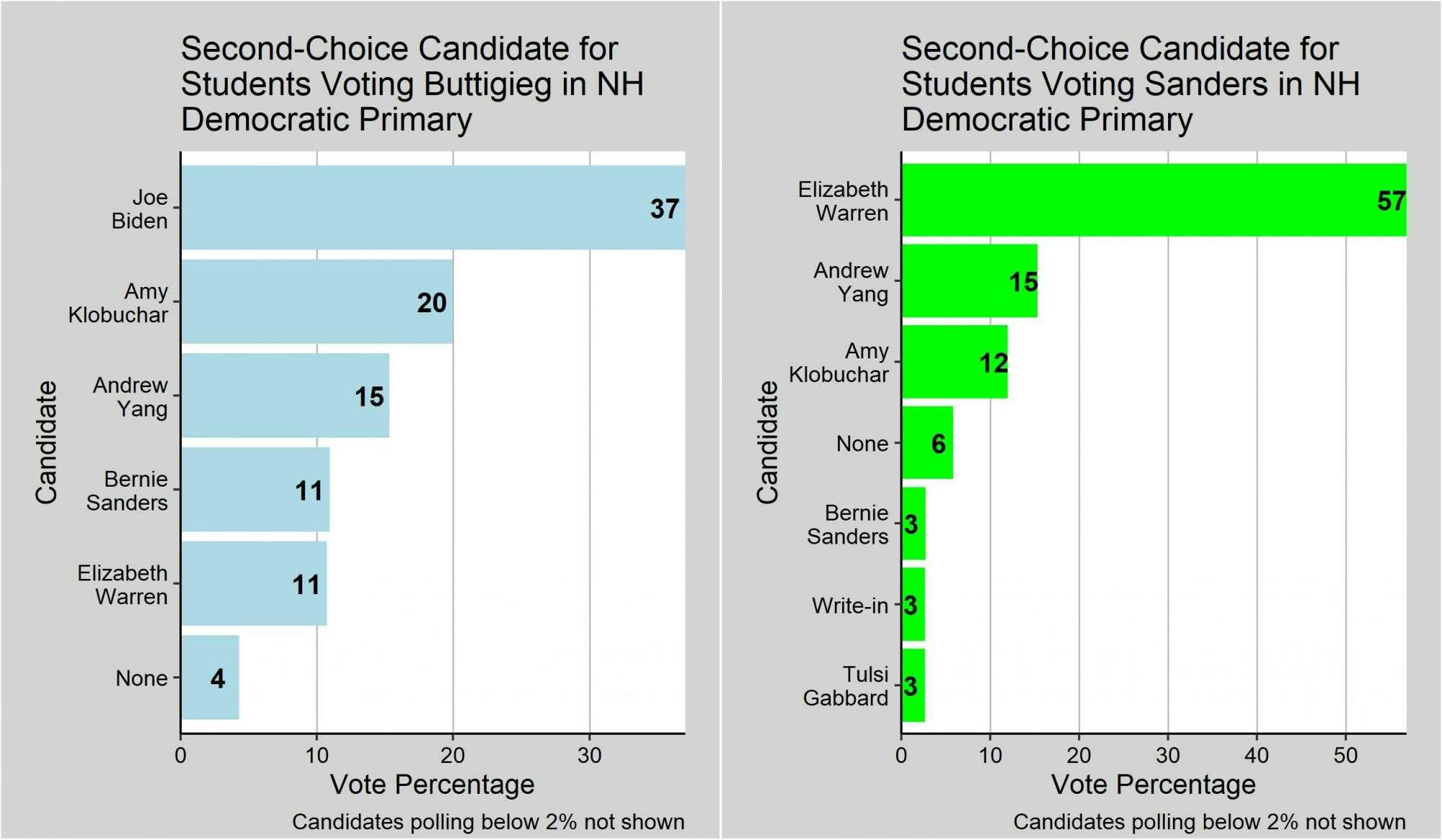
Joe Biden and Elizabeth Warren are the top second-choice candidates for students indicating they will vote for Pete Buttigieg and Bernie Sanders, respectively.
Trump leads Republican field in NH
In the Republican primary field, Trump leads by a clear margin. Among Dartmouth students who indicated that they planned to vote in today’s Republican primary, 86 percent indicated that Trump was their first choice candidate. Former Massachusetts governor Bill Weld received the support of the remaining 14 percent. Republican voters were more certain in their support for a candidate, with over 60 percent indicating that they did not have a second-choice candidate — while only six percent of Democratic voters indicated the same.
For Dartmouth students voting in other Republican caucuses/primaries, all indicated that Trump was their first-choice candidate.
More on the primary
Eighty-five percent of students indicated that their support for their first-choice candidate was very or somewhat strong, while 15 percent characterized their support as somewhat or very weak. While 44 percent of students indicated that it was unlikely that they could still be persuaded to support another candidate, 43 percent indicated that it is still very or somewhat likely they could be persuaded to change their support.
While there has been concern that recent changes in New Hampshire’s voter registration laws would depress student voter registration, The Dartmouth’s poll found that 75 percent of Dartmouth students are very or somewhat clear about the eligibility requirements to vote while the other 25 percent indicated that they were still somewhat or very unclear about the requirements.
Among Dartmouth students who indicated that they were voting in another Democratic caucus/primary, Sanders overtook Buttigieg, with 35 percent of voters indicating he is currently their first choice. Buttigieg follows with 24 percent. Other candidates with support include Warren with 16 percent, Klobuchar with 13 percent, Yang with 5 percent, Bloomberg with 5 percent and Biden with 2 percent.
Students disapprove of Trump and impeachment trial outcome
Dartmouth students remain significantly opposed to Trump’s actions as president. When asked whether they approve or disapprove of Trump’s overall job performance, only 15 percent approve, while 82 percent disapprove. Specifically regarding Trump’s actions in the Ukraine military aid controversy that led to his impeachment, 63 percent of students strongly agreed that his actions were inappropriate and wrong while another 20 percent somewhat agreed.
In terms of the U.S. Senate’s impeachment trial, most students disapproved of the way it was handled, with only 13 percent agreeing that a fair trial was conducted, while over 75 percent disagreed. Nineteen percent agreed with the Senate’s final decision to acquit Trump of all charges, while over 72 percent disagreed with this final verdict.
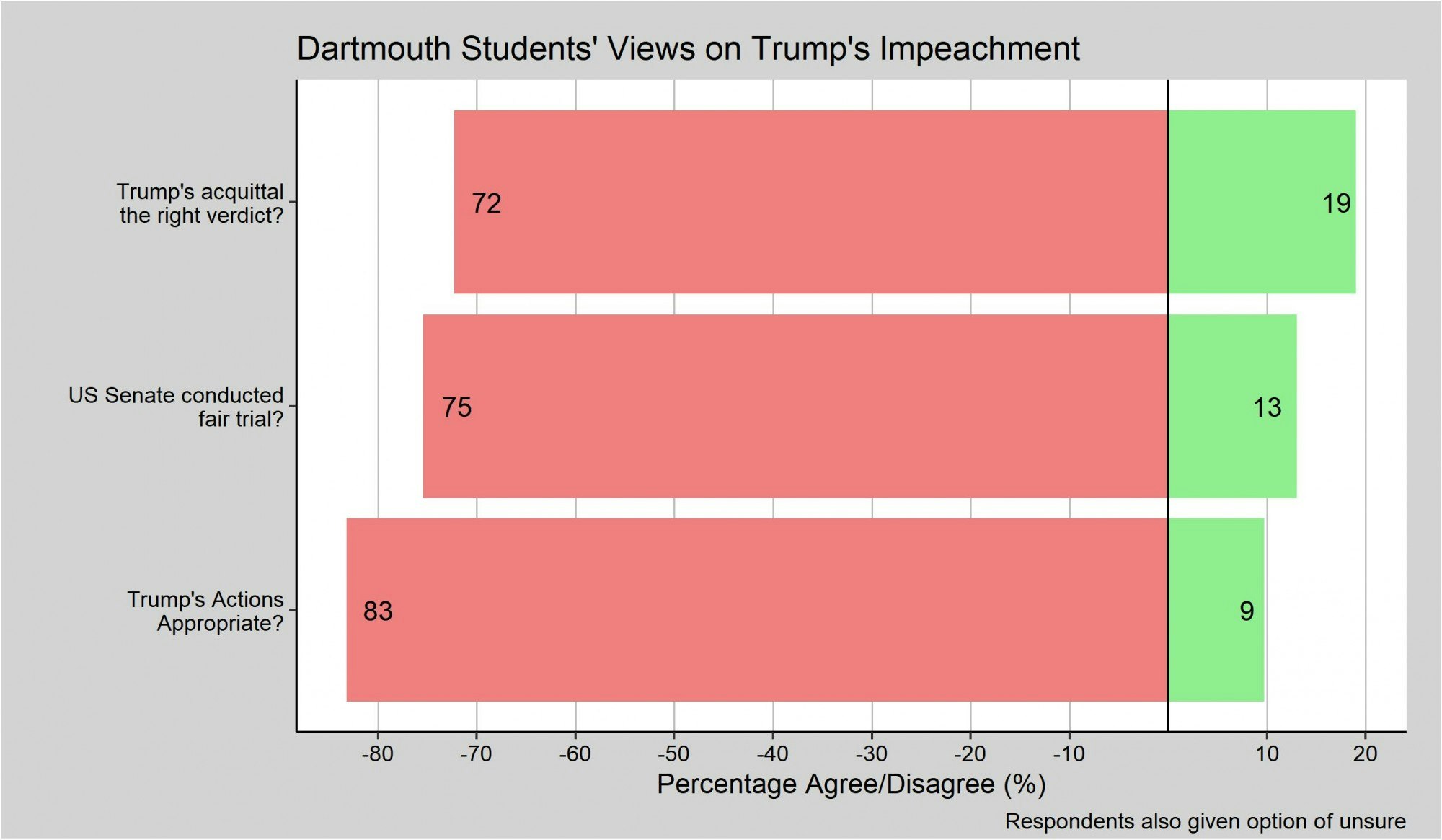
Students indicate they strongly disagree with the outcome of the impeachment trial of President Trump.
Despite Trump’s poor approval ratings among students, many still view his reelection prospects likely, with over 70 percent indicating that it is very or somewhat likely that he will win reelection this November.
Students remain highly engaged in upcoming election
Dartmouth students remain highly engaged in the upcoming presidential election. Over 91 percent indicated that they are very likely to vote in the election, while another 2 percent indicated that they are somewhat likely to. Seventy-four percent indicated that the election was a common topic of conversation among their friends.
Methodology Notes:
From Thursday, Feb. 6 to Sunday, Feb. 9, The Dartmouth fielded an online survey of Dartmouth students on their views about the upcoming primary election and other political issues. The survey was sent out to 4,692 students through their Dartmouth email addresses. Three-hundred-and-five responses were recorded, resulting in a 6.5 percent response rate. Using administrative data from the College’s Office of Institutional Research, responses were weighted by race/ethnicity, gender, and graduation year. Weighting was done through iterative post-stratification (raking). Survey results have a margin of error +/- 5.4 percentage points.

